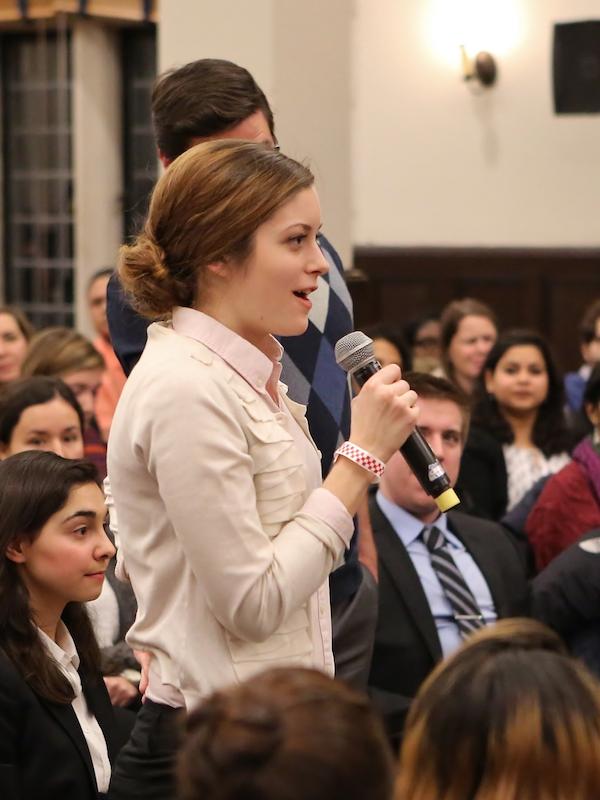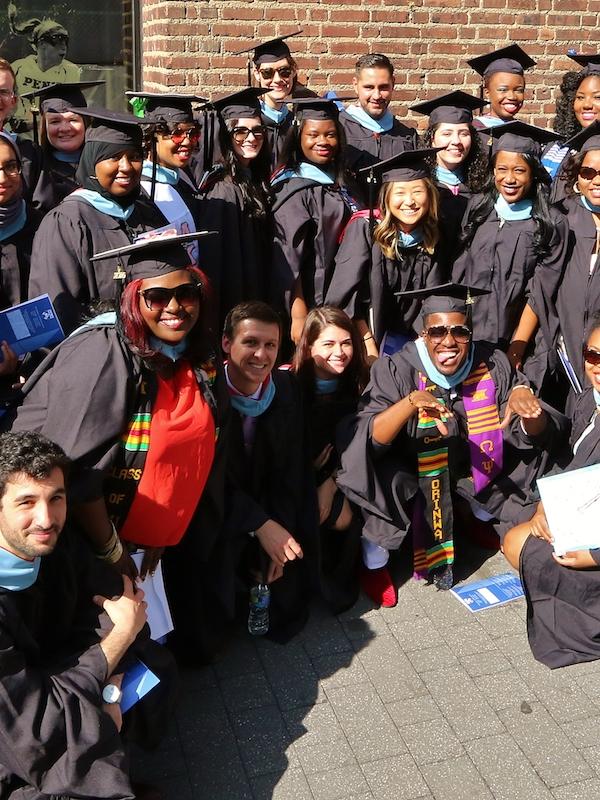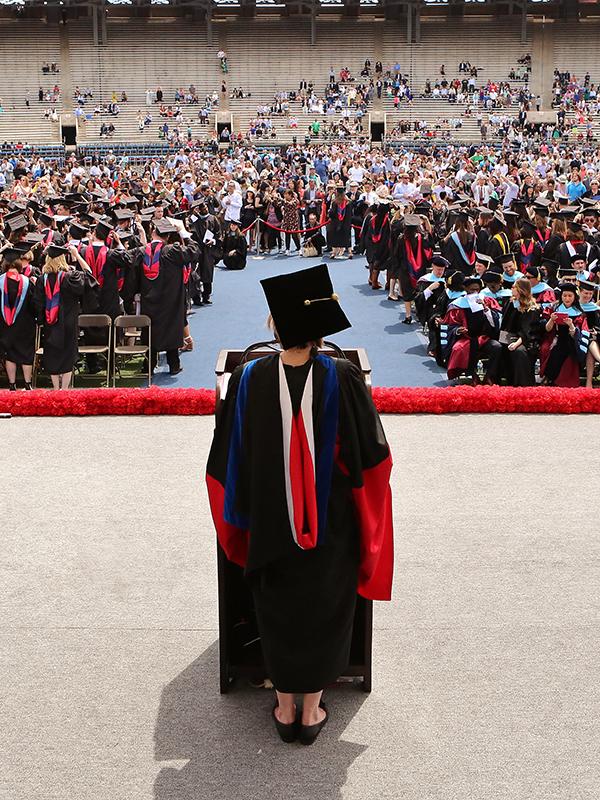Penn GSE Facilitates a Conversation on Learning and Character at Homecoming
Character, collaboration, and project-based learning were topics of conversation when Penn GSE hosted a dialogue between two education experts for alumni and friends during Penn’s Homecoming Weekend on November 9. Best-selling author Angela Duckworth, Christopher H. Browne Distinguished Professor of Psychology at Penn Arts & Sciences and secondary faculty at Penn GSE, joined Penn GSE Dean Pam Grossman, George and Diane Weiss Professor of Education, for a discussion entitled “A Conversation on Education.” Dr. Duckworth has advised the White House, the World Bank, NBA and NFL teams, and Fortune 500 CEOs. This fall, she was named a Distinguished Daughter of Pennsylvania by Governor Tom Wolf.
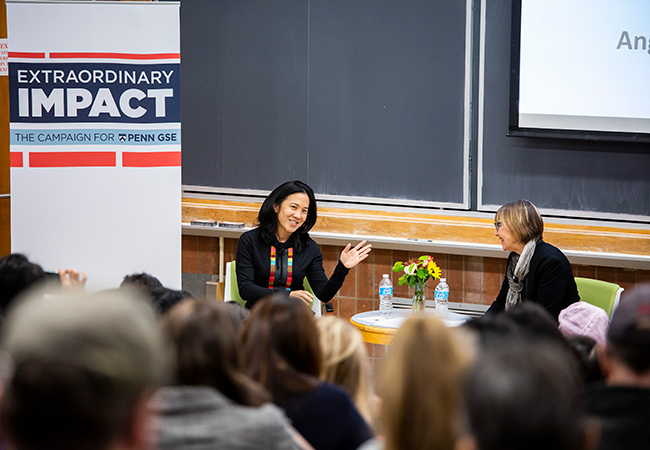
Held in Stiteler Hall, the event began with an introduction by Dr. Grossman, who noted the reach and remarkable impact of Penn GSE’s growing alumni base and highlighted the School’s planned building expansion, part of the Extraordinary Impact Campaign. “Many of our programs happen off campus and we want to bring people back to the center,” said Grossman of the project, which will expand Penn GSE’s campus facilities, linking Stiteler with the School’s central building at 3700 Walnut Street. “We’re also creating an Innovation Hub that will allow us to build new certificate programs and expand our reach.” Grossman pointed to the campaign’s broad impact across the School. “We have incredible momentum, and we've been raising money for fellowships, for programs, for faculty, for scholarships, for students,” she said.
Duckworth, the author of New York Times bestseller Grit: The Power of Passion and Perseverance and founder and CEO of the nonprofit Character Lab, is committed to exploring the science and practice of character development and understanding what it takes to help young people succeed. Trained as a psychological scientist, Duckworth defines character as leading a good life for yourself and others. “It’s not only grit and self-control, which I study as a scientist, but also gratitude and curiosity, kindness, and forgiveness,” she said. “All the things we want kids to grow up to do.”
Can we teach character explicitly to young people? Grossman posed the question of whether character can be taught or if it is “caught.” While Duckworth thinks the answer is both, she believes that exposure to models of desirable behavior is ultimately more significant to the development of character. “Your kids are always watching you,” she said, citing everyday behaviors such as how a parent answers the phone or greets visitors. “Your kids, however old they are, are picking up on cues and modeling,” she explained.
“We at GSE have made a big bet on project-based learning and more student-centered forms of learning because we think that the future of work is going to demand these kinds of things."
Both Duckworth and Grossman attended Ivy League schools and became teachers, despite pressure to enter other fields. Duckworth later determined the best way for her to help kids would be to become a researcher and use her skill set and interest in neurobiology and neuroscience. Today, her research program is inspired by her past struggle to motivate students to focus on long-term goals rather than short-term gratification. When asked what she would have done differently as a teacher based on what she knows from her current research, Duckworth noted the importance of creating strategies to motivate oneself. “If you look at very successful, very self-controlled people, it's not that they have more willpower. It’s that they have a whole arsenal of strategies,” she said. “What are the little tricks that you play on yourself to get yourself to the gym? Some people, they put their gym clothes out in the morning or they have a workout buddy.”
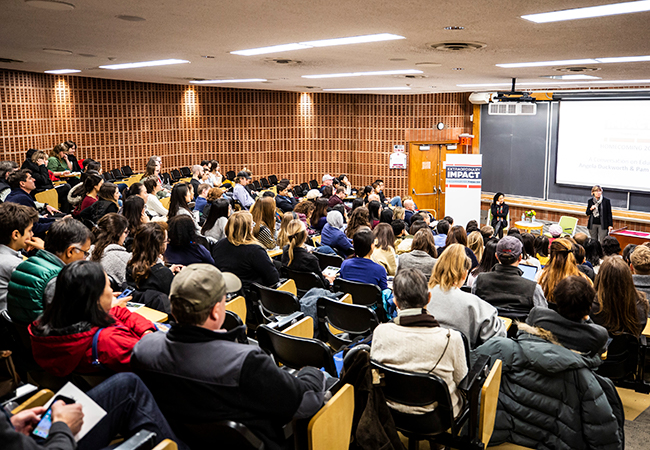
Duckworth and Grossman also discussed the increasing prevalence and importance of project-based learning, in which students learn in a self-directed manner by undertaking projects, often to create solutions to problems of local or global importance. “Project-based learning is deep, active engagement in really intrinsically meaningful problems,” Duckworth said, explaining that the approach gives students the opportunity to develop character and improve in areas such as teamwork, communication, collaboration, leadership, curiosity, creativity, grit, and self-control.The two discussed the ways in which project-based learning is not only academically and personally beneficial, but also vital to future success.
“We at GSE have made a big bet on project-based learning and more student-centered forms of learning because we think that the future of work is going to demand these kinds of things. People are going to have to invent their own ways of working,” said Grossman, whose research formed the foundation for Penn GSE’s new Project-Based Learning Certificate Program. Grossman pointed out that there is a big movement in both K-12 and at the university level to create more student-centered, active learning.
Project-based learning provided Duckworth with inspiration for a new undergraduate course debuting this spring at Penn. Called Grit Lab, the course will apply cutting-edge scientific knowledge on fostering passion and perseverance. In teams of four, the students will conduct experiments, discuss their experiences and readings, and create videos about what they’ve learned. “I called it a lab because I want students to know that life is an experiment,” said Duckworth. “I want them to experiment with failure.”
“The Graduate School of Education has an influence on all the faculty at Penn."
Duckworth and Grossman discussed how students benefit from the collaboration that project-based learning fosters. “Life is about teams,” Duckworth explained. “Nobody does anything alone.” Grossman agreed, “Being successful in life is not about just individual performance; it's about how you work with others.”
Duckworth praised Penn GSE for developing cutting-edge research and practice in education. “The Graduate School of Education has an influence on all the faculty at Penn, and everything is taught differently because of the innovation that is happening here,” Duckworth said.
Click to watch the video of the full conversation and view photos of the event.


